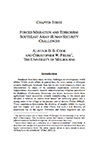Publications

Southeast Asia faces many security challenges in contemporary world affairs. Whilst world affairs in general host the wide variety of divergent security challenges, Southeast Asia has its own local dynamics, which are characterised by many of its common experiences: colonial rule; independence movements; modern industrialisation; religious penetration by Buddhism, Christianity, Hinduism, and Islam; economic shifts from agricultural based economies towards manufacturing in the recent past decades; a reliance on patron-client bonds2 for achieving goals; and a strong sense of the village as the primary unit of identity (Neher. 2002;2). These experiences demonstrate the diversity of peoples within the region and this chapter will look at what effects that such a rich diversity of experience has on the region. Terrorism and forced migration are two salient issues in the region, for which its shared histories have been the catalysts. Whilst the region is also home to other equally important contemporary security challenges forced migration and terrorism focus on their direct human consequences and that is the subject of this investigation. The aim of the chapter is to map the region’s experiences with both forced migration and terrorism and determine how these two challenges shape regional interactions.
